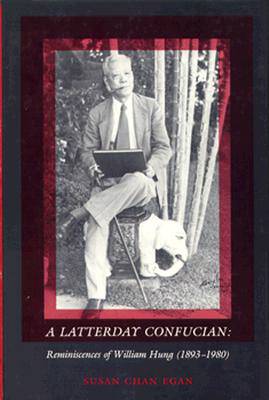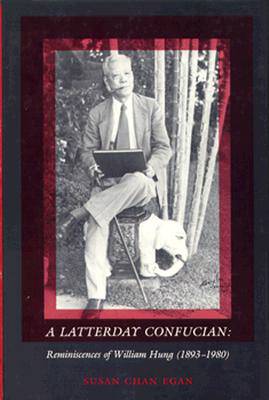
- Retrait gratuit dans votre magasin Club
- 7.000.000 titres dans notre catalogue
- Payer en toute sécurité
- Toujours un magasin près de chez vous
- Retrait gratuit dans votre magasin Club
- 7.000.000 titres dans notre catalogue
- Payer en toute sécurité
- Toujours un magasin près de chez vous
Description
As a scholar, William Hung was instrumental in opening China's rich documentary past to modern scrutiny. As an educator, he helped shape one of twentieth-century China's most remarkable institutions, Yenching University. A member of the buoyant, Western-educated generation that expected to transform China into a modern, liberal nation, he saw his hopes darken as political turmoil, war with Japan, and the Communist takeover led to a different future. yet his influence was widespread; for his students became leaders on both sides of the Taiwan Strait, and he continued to teach in the United States through the 1970s.
In 1978, he began recalling his colorful life to Susan Chan Egan in weekly taping sessions. Egan draws on these tapes to let a skillful raconteur tell for himself anecdotes from his life as a religious and academic activist with a flair for the flamboyant. His reminiscences encompass the issues and dilemmas faced by Chinese intellectuals of his period. Among the notables who figured in his life and memories were Hu Shih, H. H. Kung, Henry Winter Luce, John Leighton Stuart, Timothy Lew, and Lu Chihwei. While retaining the flavor of Hung's reminiscences, Egan explains the evolution and importance of his scholarly work; captures his blend of Confucianism, mystical Christianity, and iconoclastic thought; and describes his effect on those around him. For it was finally his unyielding integrity and personal kindness as much as his accomplishments that caused him to be revered by colleagues and generations of students.Spécifications
Parties prenantes
- Auteur(s) :
- Editeur:
Contenu
- Nombre de pages :
- 262
- Langue:
- Anglais
- Collection :
- Tome:
- n° 131
Caractéristiques
- EAN:
- 9780674512979
- Date de parution :
- 30-03-88
- Format:
- Livre relié
- Format numérique:
- Genaaid
- Dimensions :
- 162 mm x 235 mm
- Poids :
- 544 g







